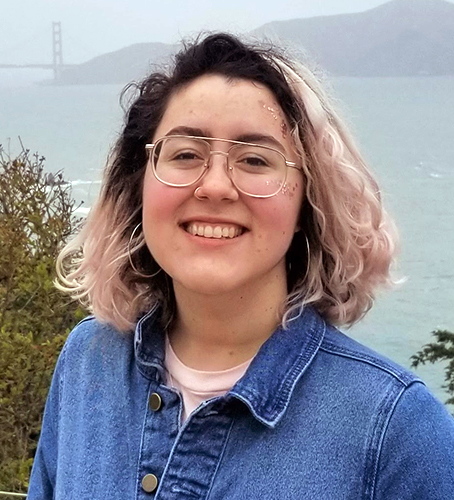Briana Sinden
M.Ed. in Clinical Mental Health and Addictions Counseling

School Psychology and Counselor Education
- 2021, William & Mary, Master of Education, Clinical Mental Health and Addictions Counseling
- 2017, William & Mary, Bachelor of Arts, Psychology
What kind of educational and professional experiences did you have prior to beginning this degree?
I worked at a group day support for dependent adults at the Virginia Institute of Autism in Charlottesville, Virginia. Working as part of a collaborative team, we provided meaningful social support and skill-building experiences for our clients and documented service data for the state.
As a student pursuing a master's degree in Clinical Mental Health and Addictions Counseling, why did you choose this field?
I chose to pursue a career in mental health counseling because I'm drawn to the subtle and powerful ways in which outward connection can foster relief and well-being for people. Counselors—through thoughtful communication, care, and support—create safe spaces where their clients can process their challenges and achieve happiness and confidence needed to thrive as their authentic selves. There's a lot of courage and vulnerability in this field, along with so much compassion and growth. I think major change is often borne out of smaller shifts in our habits and day-to-day life, so it's really the small victories in my sessions, like changes of perspective or surprised reactions about the healing power of sharing something for the first time, that motivates me in this work. I take pride in knowing that a client may use insight from our session and feel better about themselves or feel empowered to make desired change.
What do you hope to be doing after graduation? In 10 or 15 years?
After graduation, I hope to find a job where I can spend much of my time in the counseling chair, providing psychotherapy for clients. In 10-15 years, I hope I'll be doing the same, but with a strong specialization in a certain modality, a network of colleagues and professionals in the field that I can rely on for support and collaboration, and a career-governing board that has created a much more streamlined process for license portability across all 50 states (currently figuring out how to manage seeking licensure and moving across state lines!).
Why did you choose William & Mary and specifically your degree program? What sets this degree program apart from those offered at other colleges?
I went to William & Mary for undergrad, and the most impactful part of my experience was above and beyond found in the incredible people I met. They helped me grow, broaden my perspective, and aspire for greater and more meaningful opportunities. I chose William & Mary for graduate school, and specifically the Counseling and Addictions program, hoping that I would find a community with similar values to those I discovered in my undergrad peers. My hopes were correct. Counseling is about connection, and I feel that this program strongly values connection throughout the education experience. Program leaders emphasized that we go into the program with courage, vulnerability, and a trusting, open mind, as we would leave it changed people. "You take from the program what you put into it" is a frequently paraphrased sentiment, which was underscored by the many opportunities to share with one another in our cohorts, and especially by the opportunities provided to me and my peers in my cohort. In the Addictions track, we were given early opportunities for counseling field experience within weeks of beginning the program. These opportunities came with plenty of peer and supervisory support, and the chance to work with other experienced clinicians in a community agency setting. Thanks to these opportunities, which included telehealth training and a smooth transition into COVID procedures, we were prepared and confident as we entered our second-year internship experience. The program faculty includes leading figures in the field who provide students with a uniquely informed understanding of the trajectory of the profession as well as a wide breadth of knowledge about the values, skills, and characteristics needed to succeed and thrive as a counseling professional.
What has been the most influential experience you've had so far in your program?
My field experiences have been the most influential in my program, both before and after COVID. One of my field experiences in the Addictions track is with the New Leaf Clinic, a substance use-focused clinic housed within the School of Education and led by faculty with counselor education doctoral students. Working at New Leaf placed me in the counseling chair quickly, and came with supervision, during which a doctoral clinic director and other colleagues collaborate with me about case conceptualizations and give me direct feedback about my counseling skills. This hands-on and collaborative experience has been invaluable to my growth as a counselor, teaching me about the reflective process required to improve as a clinician and the resourcefulness of colleague consultation. I appreciate the opportunity to have a safe space to process a session, provide support for one another as counselors, and where I can think critically and consider different perspectives on a case.